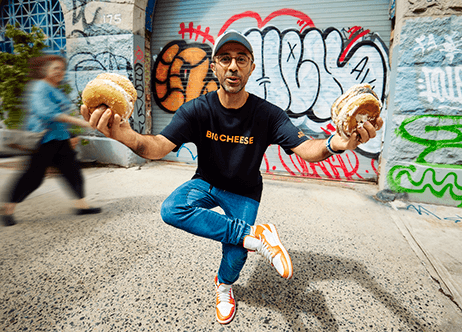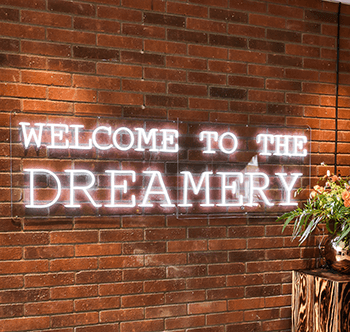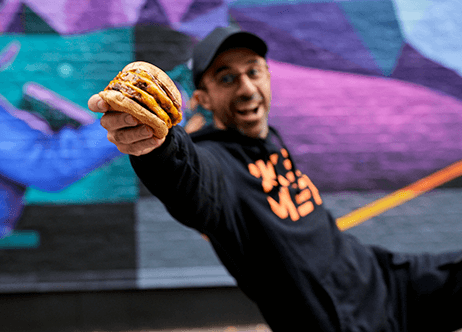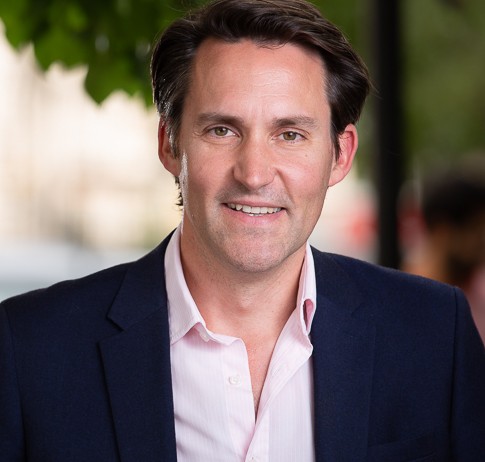Article
The big cheese: founder Sorosh Tavakoli on the next wave of plant-based innovation with Stockeld Dreamery
16 October 2024 | 5 minute read

Following the hype around plant-based alternatives to animal-derived food products and the success stories of Oatly, Impossible Foods and Beyond Meat, surviving the consumer litmus test remains the critical challenge. Sorosh Tavakoli, founder of Stockeld Dreamery shares the low down on plant-based success.
We caught up with Sorosh in New York where his team of 14 are steadily rolling out premium plant-based cheese to restaurant clients, including five of NYC's top bagel spots (according to Condé Nast Traveller). He is a busy man, passionate, driven and enthusiastic, but with an air of calm resilience which only comes from many years of experience founding businesses and riding out the boom and bust of innovation.
Prior to Stockeld Dreamery, Sorosh created Videoplaza, a successful ad platform for online video. But, he admits, "I have far more passion for what I'm doing now, it's personal and there's actual positive impact."
I have far more passion for what I'm doing now, it's personal and there's actual positive impact.
In between Videoplaza and Stockeld Dreamery, Sorosh spent two years exploring new business ideas where reducing climate impact could be built into the business model. He deep-dived into the world of alternative proteins, micro algae and Duckweed, before deciding to go all in on changing behaviours and perception of plant-based dairy by creating "the world’s most ambitious cheese." Stockeld Dreamery's cheddar alternative has 79% lower emissions than dairy-based cheddar, a sustainable accolade which is an important motivator for Sorosh and his team.
But it's not been all plain sailing building a business in the plant-based food industry. Sorosh reveals how dramatically the industry has evolved following the plant-based hype and surge in consumer interest. Consumer enthusiasm has now cooled off either because they weren't keen on the taste or because limited economies of scale meant inflation has had a big impact on pricing. Clearly it has been tough: "There's always many reasons to give up, but there's way more reasons to continue here than I would have in my last company, for example."

David and Goliath: taking on food giants
Unfortunately for Sorosh and his team, it wasn't just media hype and a lull in consumer interest which impacted growth in the market: "some products weren't necessarily that good, and then inflation slowed progress". The animal-based food industries also launched a pretty successful lobbying campaign, positioning plant-based foods as ultra-processed and high cost, which they did very successfully. And sadly "carrots don’t have a marketing budget", he observes.
"Vegan cheese actually shrunk last year to 9% in retail here in the US. And obviously there's also been a complete dry up of funding. And you need funding to grow and market yourselves."
Reflecting on what makes it work, Sorosh says: "The whole industry is challenging and many of our competitors have died. But while it's kind of tough, we have the best culture and morale in the team we've had to date, and I feel very good and proud about that. And hey, don't get me wrong, we actually have plenty of cash and we've got a pretty long runway. But we had hoped to come a lot further."
The flip side
Sorosh remains optimistic and continues to evolve their product: "On the flip side, there are plenty of companies like ourselves who've been quietly developing all these next generation products that taste better, have better performance and have better nutrition. These products are gradually being introduced into the market and hopefully we can lead the next wave of consumer adoption, where people are really happy with what they are eating and buying, and the products will offer more value to consumers."
There are plenty of companies like ourselves who've been quietly developing all these next generation products that taste better, have better performance and have better nutrition.
For Stockeld Dreamery, their fermented cheese promises to bring more authentic flavour and better performance. It's not just about spicing the cheese substitute with 'fake cheese aroma' which many perceive as ultra-processed. Their fermented plant-based cheese aligns with an age-old fermentation process which consumers are much more comfortable with, and this provides a more robust marketing story people can get on board with. "We think that's definitely something people are looking for right now," Sorosh reveals. "It's a very interesting space and a very ancient kind of technology".
They are also delving into the world of gut health, a current wellbeing hot topic, adding live probiotic cultures to their cream cheese product. This helps to align their offering with the growing trend towards functional foods that offer both nutritional benefits and improved sensory qualities.

Delivering their vision
Having been "super ambitious" with the business initially, what does the future hold for Stockeld Dreamery?
"We have found our focus, we have learned a lot, and we've scaled back some of the product ambitions to better align with demand," says Sorosh. "We're going to launch way more product this way, focusing on doing new things really, really well."
Having launched in New York about a year ago, they now have almost 130 locations, mainly restaurants, that are using their plant-based cheese.
Alongside singular focus, positive impact is the guiding principle of Stockeld Dreamery. "The mission really, really helps to keep the team together and keep us going. Finding some hope to bring an end to industrial factory farming practices is something that I think even meat lovers want to see."
Finding some hope to bring an end to industrial factory farming practices is something that I think even meat lovers want to see.
For Sorosh and many others in the plant-based industry it's not just about saving the planet: "We're going to get people healthy. We've got to get rid of a lot of cruelty and unethical ways to treat animals and improve food production in one go."
The comparison to the dairy industry is stark, which is grossly inefficient and raises important questions about animal welfare. "It's kind of weird to milk the teats of a cow, take the milk and make dairy products. There's also a lot of energy and resources needed to keep that cow alive."
On a personal level, as a founder of multiple companies and someone who has been deeply involved in brand building, navigating highly competitive food marketing challenges, Sorosh is thriving. His commitment and drive is admirable, switching industries, and continents, with his family including three children – no mean feat.

Whenever he mentions the word 'challenge' it's often presented as an opportunity to explore different avenues of thinking. "I'm learning so much still every day, there's always a fresh perspective." Sorosh's energy is infectious, and Stockeld Dreamery's bold moves are echoed across their website, including a mantra that perhaps many businesses should take note of:
"Where doers dare to dream, but even more so – where dreamers dare to do."
Visit their website: Stockeld Dreamery
Backing Innovation
Where private capital and powerful ideas meet


